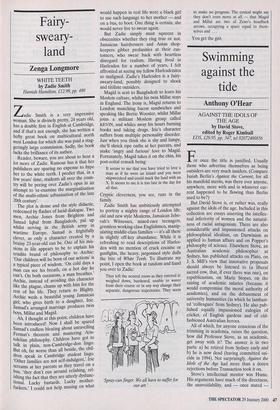Fairy-
Zenga Longmore
WHITE TEETH
by Zadie Smith Hamish Hamilton, £12.99, pp. 480 Zadie Smith is a very impressive woman. She is divinely pretty, 24 years old, has a double first in English at Cambridge, and if that's not enough, she has written a hefty great book on multicultural north west London for which she was paid a stag- geringly large commission. Sadly, the book lacks the brilliance of its author.
Reader, beware, you are about to hear a lot more of Zadie. Rumour has it that her publishers are sparing no expense to hype her to the white teeth. I predict that, in a few years' time, students all over the coun- try will be poring over Zadie's opus in an attempt to 're-examine the marginalisation of the multi-ethnic urbanisation of the late 20th century'. The plot is dense and the style didactic, redeemed by flashes of lucid dialogue. Two men, Archie Jones from Brighton and Samad Iqbal from Bangladesh, pal up Whilst serving in the British army in wartime Europe. Samad is frightfully clever, as only a character created by a brainy 23-year-old can be. One of his mis- sions in life appears to be to explain his erudite brand of philosophy to Archie: Our children will be born of our actions' is a typical piece of wisdom. 'On cold days a man can see his breath, on a hot day he Can't. On both occasions, a man breathes.' Archie, instead of avoiding this character like the plague, chums up with him for the rest of his life. They return to Blighty. Archie weds a beautiful young Jamaican girl, who gives birth to a daughter, Irie. Samad's arranged marriage produces twin boys, Millat and Magid. Ah, I thought at this point, children have been :introduced! Now I shall be spared Samad's endless bleating about unravelling Fermat's theorem and mastering Aris- tolelian philosophy. Children have got to talk in plain, non-Cambridge-don lingo. But oh, far worse than all beside, the chil- dren speak in Cambridge student lingo. Other families are not self-indulgent,' Irie screams at her parents as they travel on a bus, 'they don't run around relishing, rel- ishing the fact that they are utterly dysfunc- tional. Lucky bastards. Lucky mother- fuckers.' I could not help musing on what would happen in real life were a black girl to use such language to her mother — and on a bus, to boot. One thing is certain, she would never live to swear again.
But Zadie simply must squeeze in obscenities whether they ring true or not. Jamaican hairdressers and Asian shop- keepers gibber profanities at their cus- tomers, who swear back with heartless disregard for realism. Having lived in Harlesden for a number of years, I felt affronted at seeing my fellow Harlesdenites so maligned. Zadie's Harlesden is a fairy- sweary-land, possibly designed to shock and titillate outsiders.
Magid is sent to Bangladesh to learn his Moslem culture, whilst his twin Millat stays in England. The irony is, Magid returns to London munching bacon sandwiches and speaking like Bertie Wooster, whilst Millat joins a militant Moslem group called KEVIN, and whiles away his hours burning books and taking drugs. Irie's character suffers from multiple personality disorder. Just when you think she is shy and lumpy, she'll shriek ripe oaths at her parents, and make 'angry and furious' love to Magid. Fortunately, Magid takes it on the chin, his post-coital remark being:
It seems to me that you have tried to love a man as if he were an island and you were shipwrecked and could mark the land with an X. It seems to me it is too late in the day for all that.
Cryptic cleverness, you see, runs in the family.
Zadie Smith has ambitiously attempted to portray a mighty range of London life: old and new style Moslems, Jamaican Jeho- vah's Witnesses, mixed-race teenagers, gormless working-class Englishmen, manip- ulating middle-class families — it's all there in slightly off-key abundance. While it is refreshing to read descriptions of Harles- den with no mention of crack cocaine or gunfights, the heavy, jargonised style dulls the bite of White Teeth. To illustrate my point, I open the book at random and hand you over to Zadie:
They left the neutral room as they entered it: weighed down, burdened, unable to waver from their course or in any way change their separate, dangerous trajectories. They seem
'Spray-can finger. We all have to suffer for our art.'
to make no progress. The cynical might say they don't even move at all — that Magid and Millat are two of Zeno's headfuck arrows, occupying a space equal to them- selves and ...
You get the gist.


















































































 Previous page
Previous page